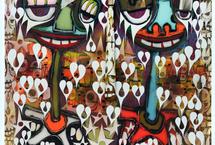New York-based painter Phil Frost (b. 1973) has evolved a consistent, instantly recognizable aesthetic synonymous with his name, which he refers to as “intuitive perceptive portraiture.” This first exhibition of new work at Galería Javier Lopez testifies to his relevance and extensive cultural reach as a leading contemporary artist who is self taught. Frost’s title for the exhibition, with its multiple meanings, alludes to a gestural build up of glyphic information. A counting, chanting, pulsing persistence of rhythm decoding an inner perception of interactive epiphany. Frost’s visual language melds layers of flat white culturally indeterminate mask-like forms with bold typographical and fluid glyphic geometric and sinuous shapes that dance above vivid spectrums of painterly color, forming the long necked busts and repetitions of faces that are pronounced as his intuitive portraiture.
Raised in rural Western Massachusetts from a young age; he grew up searching for and sometimes finding Indian adzes and arrowheads in farm fields and forests; and made use of a natural fountain found at the edge of the woods that spouted clay by sitting at its rim and forming shapes in his hands. The unearthed treasures were impressed upon his mind and this archaeological drive influenced him and would continue and later reveal itself when he began making work imbued with collected and found objects as a way to present the actual passage of his life gesturally into the context of a painted visual passage; a representation to articulate how the now inflects a lineage of experience in time and space that is formed both physically and intuitively from what is around him.
As his adolescence matured he moved, along with his younger sister and mother, by whom he was solely raised, to Cooperstown, NY for just over two years where an early fascination with baseball and in particular the position of pitching and the arabesque-like gesture made by a swinging bat was deepened. Often taking off on excursions to New York City to skateboard with friends, he was led to an awareness and depth of interest in graffiti and anonymous mark - making.
Early work with typography found him knocking out the negative space created by letterforms with white as a way to “pop” or form random patterns of shape to react against color. The fluid and sinuous patterns of white shapes that most often recently dominate his work came from a progressive evolution of the reduction of words that once, more often formed a nonsensical lingual chanting woven throughout the layering in his portraiture.
